- Last Updated: January 15th, 2026
Key Takeaways
To be eligible to file a Tylenol lawsuit claim, individuals must have suffered injury or harm as a direct result of using Tylenol products.
Eligibility criteria can vary depending on the specific lawsuit and its allegations. Plaintiffs may need to prove factors like product defects, inadequate warnings, or misleading marketing.
Determining eligibility can be complex. It's advisable for potential claimants to consult with legal experts who can assess their individual circumstances and guide them on the appropriate course of action regarding Tylenol-related claims.
Tylenol Lawsuit Eligibility: Who Can File a Claim?
On this page, we’ll discuss who is eligible to file a Tylenol Lawsuit claim, how to choose legal representation for Your Tylenol Lawsuit, and much more.
Intro To The Tylenol Lawsuit
Acetaminophen usage lawsuits, particularly those involving Tylenol, have become a significant part of the legal landscape and mass torts.
Numerous plaintiffs are seeking redress for personal injuries allegedly caused by this over-the-counter medication, leading to an increase in mass tort litigation.
These cases are a critical aspect of product liability law.
Understanding eligibility criteria in such Tylenol lawsuits, including the Tylenol class action lawsuit, is crucial for potential claimants.
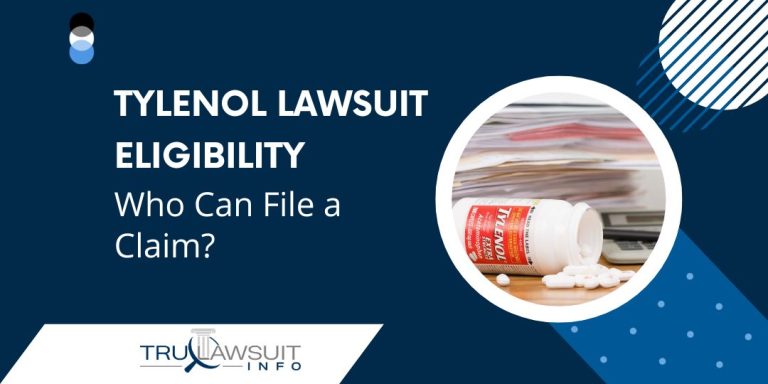
Tylenol lawyers can provide guidance in these product liability lawsuits.
The concept of eligibility, in legal terms, refers to potential plaintiffs who can rightfully file a product liability claim under the purview of mass tort lawsuits or a Tylenol class action lawsuit.
It is essential for both incoming plaintiffs and individual plaintiffs to understand this concept.
Recognizing the importance of understanding product liability lawsuits, the role of attorneys in legal proceedings, and eligibility for multidistrict litigation cannot be overstated.
Litigation plays an integral role in civil lawsuits, ensuring successful claims for plaintiffs and achieving justice with the help of attorneys for those affected.
As such, it is imperative for plaintiffs to consult with trial attorneys and gain clarity on this subject before proceeding with any litigation related to Tylenol or other acetaminophen products.
Lawyers are crucial in this process.
Eligibility Criteria for Filing a Claim
Filing a claim in the acetaminophen lawsuits, specifically the Tylenol litigation, requires meeting specific criteria.
This includes the acetaminophen autism lawsuits where plaintiffs must adhere to certain standards.
The first step is to establish if the injury occurred due to the use of generic acetaminophen, often known as Tylenol, potentially leading to an acetaminophen lawsuit.
This is particularly relevant in cases of acetaminophen exposure possibly linked to autism.
This involves providing medical records in an acetaminophen lawsuit as evidence of acetaminophen exposure, which should clearly indicate that generic acetaminophen, like Tylenol, was prescribed or used and subsequently led to an injury, potentially leading to product liability.
Required Documentation
To prove eligibility, several documents are necessary:
- Medical records highlighting the use of Tylenol
- Proof of purchase or prescription for Tylenol
- Evidence showing that the injury resulted from using Tylenol
The court form complaint, also known as a short form complaint, is another important document required in litigation proceedings.
This document is crucial for plaintiffs in cases to initiate legal action.
This document provides detailed information about your claim, serving as your official complaint within the court.
It’s pivotal for plaintiffs in district litigation cases and is a crucial tool for attorneys.
Legal Implications
If you fail to meet these criteria, there could be serious legal implications, potentially leading to product liability litigation.
Attorneys, specifically Tylenol lawyers specializing in this field, are key players in such situations.
The court may dismiss Your litigation claim, leaving you, the plaintiff, responsible for any court fees incurred during this process.
This is why attorneys meticulously prepare for such cases.
In some autism lawsuits, plaintiffs can file an immediate appeal.
However, this will require additional documentation and potentially more court fees, often necessitating the assistance of litigation lawyers.
Common Misconceptions
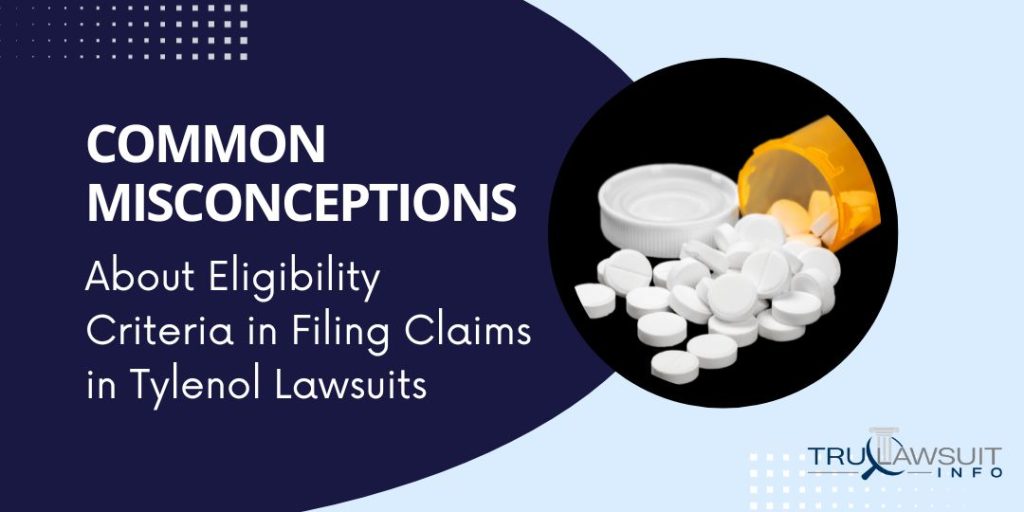
There are common misconceptions about plaintiffs filing litigation claims in such cases, often propagated by lawyers:
- Not every plaintiff who has used acetaminophen, specifically Tylenol, can file an autism lawsuit or join a Tylenol class action lawsuit.
- Only plaintiffs who have suffered injuries due to its usage, particularly pregnant women without proper warning, are eligible for liability claims.
- Having medical records is crucial for plaintiffs in court cases, as they serve as evidence supporting their claim.
- Lawyers often use these documents when representing their clients.
- A master complaint or form complaints aren’t optional but mandatory parts of court cases involving plaintiffs in district litigation.
- An immediate appeal in court cases isn’t always possible and often requires more substantial evidence than initial claims by plaintiffs.
This is particularly true in cases involving exposure-related issues.
Understanding these points helps clarify what’s involved for plaintiffs in filing autism lawsuits under the Tylenol lawsuit, specifically cases related to acetaminophen use.
Liability and Preemption Argument
In these cases, liability is a critical factor for the plaintiffs; it’s about proving that the negligent acetaminophen use, specifically Tylenol, by the manufacturer led to the injury in court.
However, a common argument used by defendants in court cases is the preemption argument, often a warning to plaintiffs.
This argues that federal court law, which allows the sale of acetaminophen-based Tylenol, preempts state laws upon which such cases by plaintiffs are based.
Understanding Tylenol Autism Lawsuits
The connection between acetaminophen, commonly known as Tylenol, and autism cases has become a significant point of contention in recent years, especially with ADHD symptoms being reported.
This has led to a class action lawsuit and a need for a clear warning.
A number of parents, as plaintiffs in ADHD and Tylenol autism lawsuit cases, allege that their children’s autism and ADHD were caused by exposure to acetaminophen during pregnancy, the active ingredient in Tylenol.
Prevalence of Lawsuits
In recent years, there’s been a surge in new acetaminophen-related ADHD and autism lawsuit filings, with plaintiffs presenting compelling cases.
These lawsuits, brought forth by plaintiffs, contend that Johnson & Johnson, the manufacturer of Tylenol, an acetaminophen product, failed to warn consumers about the potential risks and cases of exposure associated with its product.
The plaintiffs in the class action lawsuit argue that had they been properly informed about the potential link of acetaminophen in Tylenol to autism, they would have chosen different treatment options for their children’s ailments.
This forms the basis of numerous Tylenol autism lawsuits and cases.
It’s worth noting that these cases are not isolated incidents but part of a larger class action lawsuit trend involving plaintiffs, notably children.
The prevalence of acetaminophen-related lawsuits involving plaintiffs with ADHD cases has led to what is known as a “Tylenol autism class action lawsuit.’’
In this type of litigation, a group (or “class”) of plaintiffs with similar cases band together to initiate an action lawsuit against a defendant under the oversight of a judge.
Key Court Decisions
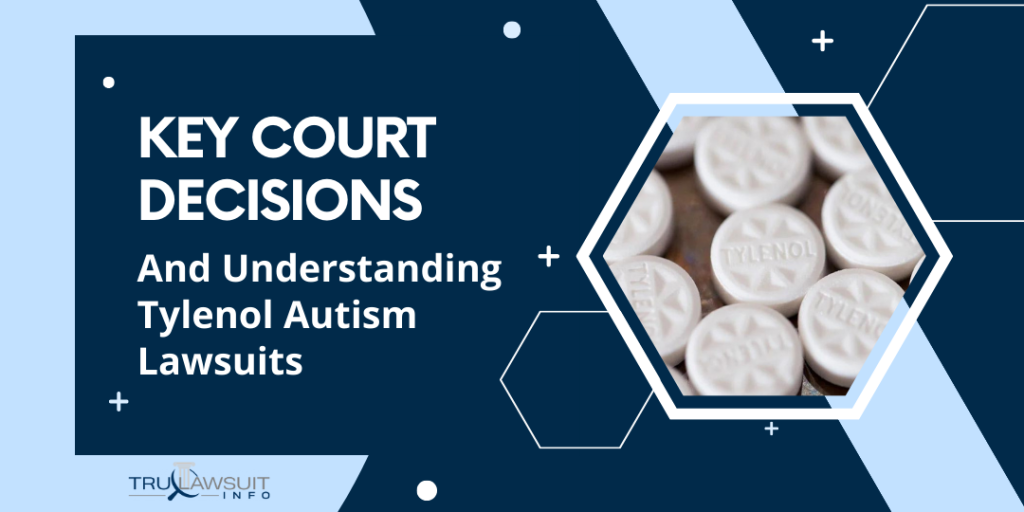
Several key court decisions involving plaintiffs, a class action lawsuit, the judge, and MDL have shaped these suits over time.
One notable class action lawsuit is the Tylenol autism MDL (multidistrict litigation), where numerous plaintiffs from across different districts were consolidated into one proceeding for efficiency and consistency.
This case involves the use of acetaminophen and its potential link to ADHD.
However, it should be noted that while some courts have allowed these Tylenol-related class action lawsuits to proceed, others have dismissed them due to a lack of compelling evidence linking acetaminophen use during pregnancy and autism spectrum disorder or ADHD in children.
The plaintiffs in these cases argue the connection, but the evidence is not always deemed sufficient.
The Distinctiveness of Autism-Related Lawsuits
ADHD-related lawsuits, often led by plaintiffs in a class action, differ from other types judged in several ways:
- Given the multifactorial nature of pregnancy, autism, and ADHD (Attention Deficit Hyperactivity Disorder), establishing causality can be challenging – a complexity often seen in MDL lawsuits and class action cases.
- In ADHD-related lawsuits, plaintiffs often require testimony from experts in neurology or developmental psychology.
- The judge evaluates these cases with the help of such medical expertise.
- If the judge deems these MDL actions related to pregnancy successful, these lawsuits can result in substantial compensation for the plaintiffs.
Latest News and Potential Settlements
Recent Developments
Recent developments in the Tylenol litigation landscape have seen an increase in new lawsuit cases being filed by plaintiffs.
This action is primarily related to acetaminophen.
These lawsuits are primarily centered around the issues related to the potential damages caused by Tylenol products, specifically acetaminophen, with plaintiffs alleging harm during pregnancy.
The court resources, both at the state and federal level, are being stretched as judges handle these multidistrict litigations (MDL).
The plaintiffs in these lawsuits are contributing to the strain.
Several new research studies have emerged, providing critical information that could influence future lawsuits involving a judge, pregnancy concerns, MDL procedures, and acetaminophen usage.
These studies focus on the potential health impacts of prolonged use of Tylenol, an acetaminophen product, during pregnancy, contributing to a growing consensus among experts in this field and leading to an ADHD-related lawsuit.
Notable Settlements
In terms of notable settlements or verdicts, there are a few standout examples involving a judge, an autism-related lawsuit, or a case under MDL:
- In May 2020, a settlement was reached in an acetaminophen lawsuit where a woman suffered liver damage after consuming Tylenol during her pregnancy over several years, leading to an MDL.
- A high-profile lawsuit verdict was delivered by the judge when the court ordered Johnson & Johnson to pay $8 billion in the MDL for failing to warn about potential pregnancy risks associated with their product.
These acetaminophen Tylenol lawsuit cases serve as precedents and provide valuable insights for potential clients considering filing a claim against Tylenol manufacturers.
The rulings by the judge in these MDL (Multidistrict Litigation) cases are particularly informative.
Factors Influencing Settlement Amounts
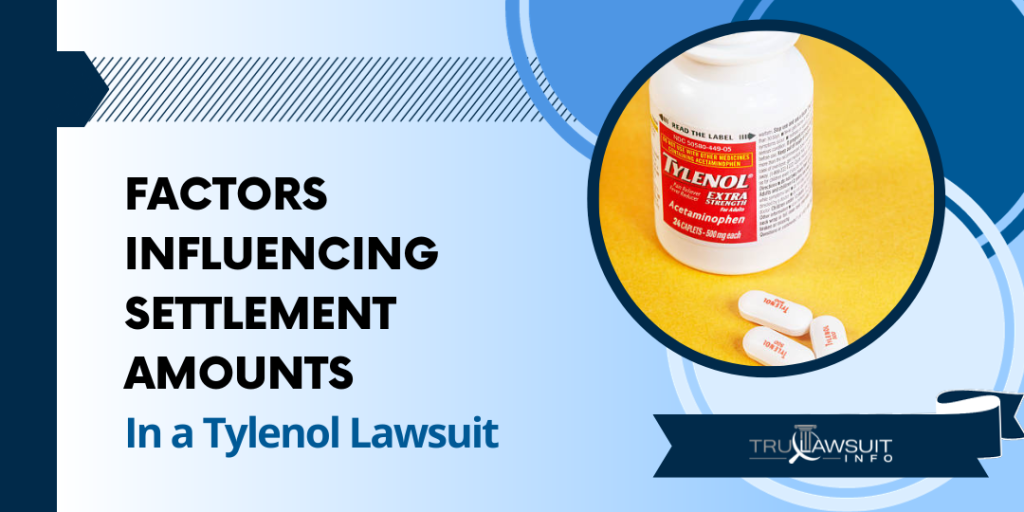
The settlement amounts in these MDL lawsuits, presided over by a judge, depend on various factors, including cases related to autism and Tylenol.
Here are some of the factors:
- Severity of damages sustained by plaintiffs
- Evidence presented during trials
- Expert reports and testimonies
- Past verdicts and settlements
A status conference involving the judge is often held to discuss these factors in an MDL lawsuit related to pregnancy before deciding on any settlement amount.
Impact on Future Claims
The impact of these updates on future lawsuit claims, particularly in the context of autism and MDL, cannot be understated, even by a judge.
They not only provide guidance for potential clients in a lawsuit but also help shape laws governing issues such as autism under the watchful eye of an MDL judge.
As more information becomes available through new research and expert reports, it’s likely we’ll see changes in how future lawsuits, such as those involving the judge, MDL, acetaminophen, and Tylenol autism cases, are approached.
It’s crucial to note that each lawsuit, be it a judge-led MDL or an acetaminophen or Tylenol autism case, is unique.
Hence, outcomes may vary from case to case depending upon the specific circumstances involved.
Remember: if you believe you may be eligible to file an acetaminophen (Tylenol) lawsuit, it’s essential to seek legal advice from a judge or MDL (multidistrict litigation) expert.
Particularly if you’re considering a case related to autism, stay updated on the latest news and potential settlements.
New Risks Associated with Tylenol
Recent findings have begun to illuminate potential risks linked to Tylenol acetaminophen, a common over-the-counter pain reliever, leading to an autism lawsuit.
This has caught the attention of an MDL judge who is overseeing the case.
This brand of acetaminophen, commonly known as Tylenol, has been widely used for decades, but new studies suggest that both short-term and long-term use can lead to unexpected health complications, including potential links to autism.
Amidst these concerns, an MDL lawsuit has been filed and is currently under review by a judge.
For instance, a groundbreaking study central to a current Tylenol autism lawsuit found a correlation between prenatal acetaminophen exposure and an increased risk of behavioral issues in children.
The case is currently under review by an MDL judge.
In utero, acetaminophen exposure, a central issue in an ongoing autism-related MDL lawsuit, was previously thought to be harmless.
However, new evidence presented before the judge suggests that even occasional Tylenol usage during pregnancy could potentially harm the child’s development.
Newly identified side effects linked to acetaminophen, both generic and brand Tylenol, include liver damage and skin reactions.
This has led to an autism-related lawsuit and the formation of an MDL.
These potential risks associated with acetaminophen are particularly relevant for those considering filing a Tylenol lawsuit in an MDL, especially under the scrutiny of a judge, given the alleged links to autism.
Potential Risks Associated With Tylenol (Acetaminophen)
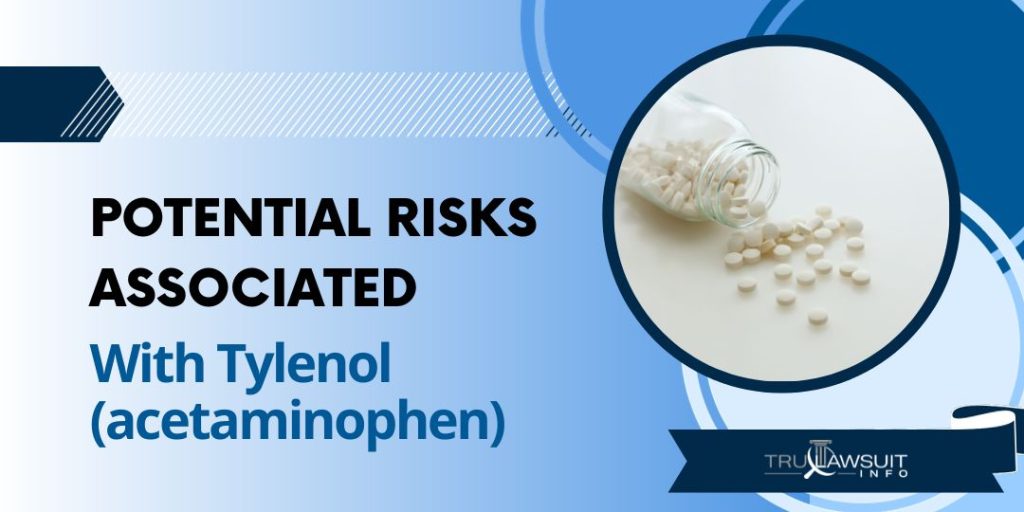
Here are some of the potential risks associated with acetaminophen:
- High doses or prolonged use of acetaminophen, often known as Tylenol, can lead to acute liver failure, a serious condition that requires immediate medical attention.
- This has led to an MDL lawsuit linking Tylenol and autism.
- Some people may experience severe skin reactions like Stevens-Johnson Syndrome (SJS), toxic epidermal necrolysis (TEN), or acute generalized exanthematous pustulosis (AGEP) after taking acetaminophen products such as Tylenol.
- This has led to an MDL lawsuit, with claims linking Tylenol to autism.
These new findings related to acetaminophen might significantly impact existing and future autism-related lawsuit claims against Tylenol manufacturers.
For instance, individuals who experienced severe side effects such as Tylenol autism after using generic acetaminophen products might now be eligible to file a lawsuit if they were previously unaware of these risk factors.
Consumers should also take note of these developments, such as the acetaminophen autism lawsuit and Tylenol autism claims, as they consider their options for pain relief.
While the risk is low for most people who use acetaminophen or Tylenol as directed, it’s crucial to weigh these potential risks against the benefits, especially considering the Tylenol autism lawsuit.
The implications for consumers using Tylenol, associated with autism in a lawsuit, or generic acetaminophen are significant:
- Increased Awareness: Consumers need to be aware of potential side effects and risks associated with acetaminophen use, such as the alleged Tylenol-autism link and any related lawsuits.
- Informed Decision-Making: With this information on autism, acetaminophen, and the Tylenol lawsuit, consumers can make more informed decisions about their health and wellness.
- Legal Recourse: If a consumer experiences severe side effects such as Tylenol autism from acetaminophen use, they may now have legal recourse, including filing a lawsuit.
These new risks associated with acetaminophen, the active ingredient in Tylenol, are a reminder that even common over-the-counter medications can carry significant risks, potentially leading to lawsuits or even autism.
Choosing Legal Representation for Your Tylenol Lawsuit
Specialized Legal Representation
In drug-related suits such as the Tylenol lawsuit involving acetaminophen and autism, choosing a specialized legal team is crucial.
These lawsuit cases often involve complex scientific and medical details, such as those surrounding acetaminophen and potential Tylenol autism links, that require expert understanding.
Attorneys experienced in autism-related matters can provide valuable insight and advice on Tylenol or acetaminophen cases, ensuring you navigate the litigation process efficiently.
Tylenol ADHD lawyers who have dealt with acetaminophen-related or autism lawsuits before will be familiar with the strategies used by defense teams.
They can effectively counter these tactics related to acetaminophen, Tylenol, and autism, presenting your case convincingly before a jury.
Selecting an Attorney: Key Considerations
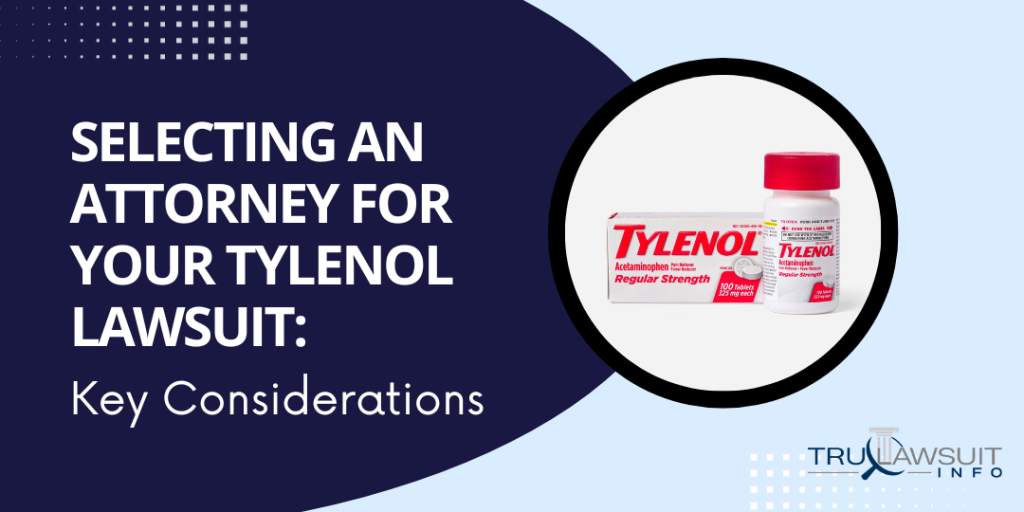
When selecting your attorney for a civil lawsuit related to autism and the use of Tylenol or acetaminophen, consider their expertise:
- Look at their track record in handling similar cases, specifically those involving autism and the use of Tylenol or acetaminophen.
- Check if they specialize in mass tort or drug-related suits, specifically those involving acetaminophen or Tylenol autism cases.
- Research about their standing in the legal community.
- Ensure they have enough time to devote to your autism case, particularly concerning Tylenol and acetaminophen usage.
Also, inquire about potential costs associated with hiring them.
Some law firms specializing in acetaminophen and Tylenol cases offer free consultation services and work on a contingency basis, meaning you only pay if you win.
The Attorney-Client Relationship
The relationship between autism and acetaminophen, much like that between client and attorney, plays a significant role in lawsuit success, with Tylenol being a common subject.
Good communication ensures that your lawyer understands your expectations regarding the autism case and informs you about any developments, such as the involvement of Tylenol or acetaminophen.
Your attorney, whether discussing acetaminophen, Tylenol, or autism, should be approachable, responsive, and respectful of your concerns.
This encourages open dialogue about autism and Tylenol, which can lead to better representation during court proceedings.
Understanding Potential Costs
Hiring legal representation can be costly.
However, most attorneys specializing in Tylenol and acetaminophen-related autism cases offer different payment options suitable for various financial situations.
Here are some considerations:
- Hourly rate
- Flat fee
- Contingency fee (you pay only if you win)
In addition to lawyer’s fees, other expenses might include court filing fees, charges for expert testimony or witness depositions, and travel costs related to the lawsuit.
Remember that investing in quality legal representation could mean the difference between a successful claim and negligent misrepresentation, especially in cases involving acetaminophen or Tylenol autism.
Discuss all potential costs and side effects of Tylenol, particularly acetaminophen’s link to autism, with your attorney upfront to avoid any surprises later.
Exploring the Connection: Tylenol, Autism, and ADHD
Overview of Studies Linking Tylenol with Autism/ADHD
Research has shown a potential connection between acetaminophen (the active ingredient in Tylenol) and autism or attention deficit hyperactivity disorder (ADHD).
Some studies suggest that prolonged use of acetaminophen, a common pain reliever also known as Tylenol, during pregnancy may increase the risk of developmental disorders like autism in children.
The data suggest a potential link between prenatal exposure to Tylenol (acetaminophen) in utero and higher rates of autism spectrum disorder (ASD) or hyperactivity symptoms in children.
However, it’s essential to note that studies on acetaminophen, Tylenol, and autism do not establish a causal link.
They merely show an association between acetaminophen use, often recognized as Tylenol, and increased rates of ASD, also known as autism or ADHD diagnoses.
Further research is needed to understand how, if at all, acetaminophen, also known as Tylenol, impacts fetal brain development and potentially contributes to autism.
Scientific Consensus on the Connection
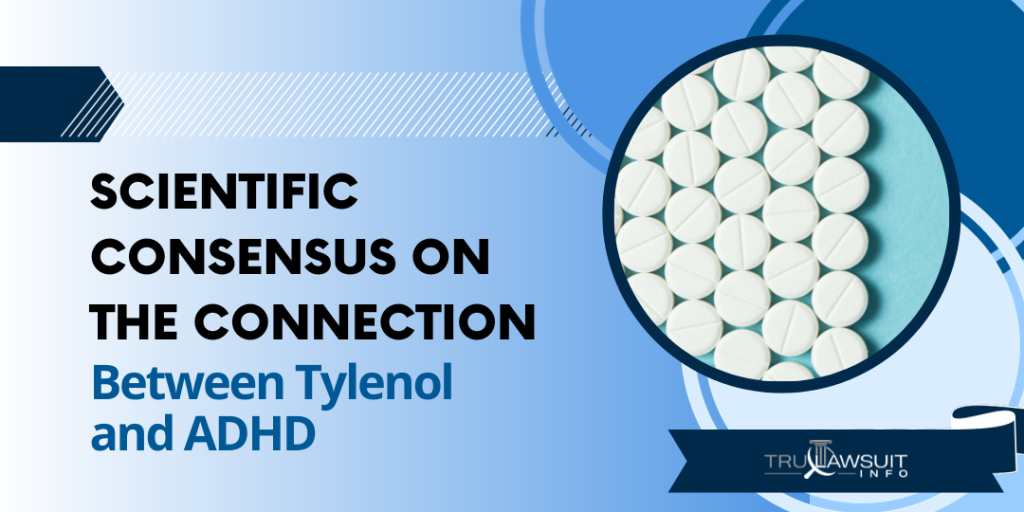
The scientific community does not yet share consensus on the alleged connection between acetaminophen, often known by the brand name Tylenol, and neurodevelopmental disorders like ASD or ADHD, including autism.
While some studies suggest a potential correlation between acetaminophen use and Tylenol autism, others find no significant link.
Therefore, more comprehensive research on acetaminophen and its potential link to Tylenol autism is needed before any definitive conclusions can be drawn.
Relevance to Ongoing Litigation Efforts
This possible connection between Tylenol, also known as acetaminophen, use, and autism/ADHD diagnoses has legal implications as well.
If evidence solidifies showing that acetaminophen, commonly known as Tylenol, significantly increases the risk for conditions like autism, those affected may be eligible to file a lawsuit against the manufacturers.
Currently, several lawsuits allege that Johnson & Johnson failed to adequately warn consumers about the potential risks associated with their product, specifically in relation to Tylenol autism and acetaminophen.
Impact on Families Dealing with Autism/ADHD Diagnoses
The possibility that commonly used medication like Tylenol, which contains acetaminophen, could contribute to autism or ADHD diagnoses understandably worries many families dealing with these conditions.
The use of Tylenol, also known as acetaminophen, during pregnancy and early childhood adds another layer of complexity to decisions about medication use, particularly given the discussions around Tylenol and autism.
Families affected by autism (ASD) or ADHD already face numerous challenges, including decisions about medications like acetaminophen, commonly known as Tylenol.
These include securing appropriate educational resources for autism, navigating social stigma around acetaminophen use, and managing the financial burden of Tylenol treatment.
If a link between acetaminophen, commonly known as Tylenol, and conditions like autism is confirmed, it could lead to increased stress for these families.
Impact of Tylenol Lawsuit on Consumer's
Changes in Consumer Perception
The Tylenol lawsuit, linked to acetaminophen and autism, has significantly altered consumer perception of the product.
A large number of individual plaintiffs have come forward with product liability claims, alleging that the manufacturers of Tylenol, a common acetaminophen drug, failed to adequately warn about potential risks and damages associated with its use, including a possible link to autism.
This shift in public opinion has made consumers more cautious when purchasing over-the-counter medications like Tylenol, an acetaminophen product, due to increasing discussions around autism.
Impact on Sales and Market Share
As a result of the negative publicity surrounding the lawsuit concerning acetaminophen and its possible links to autism, there’s been a noticeable impact on sales and market share for Tylenol.
Retailers have reported a decline in Tylenol sales due to decreased consumer confidence in the acetaminophen product, particularly among the autism community.
Furthermore, other manufacturers producing similar products like acetaminophen and Tylenol have seen an increase in their market share as consumers look for alternatives, especially in the autism community.
Influence on Product Labeling and Warnings
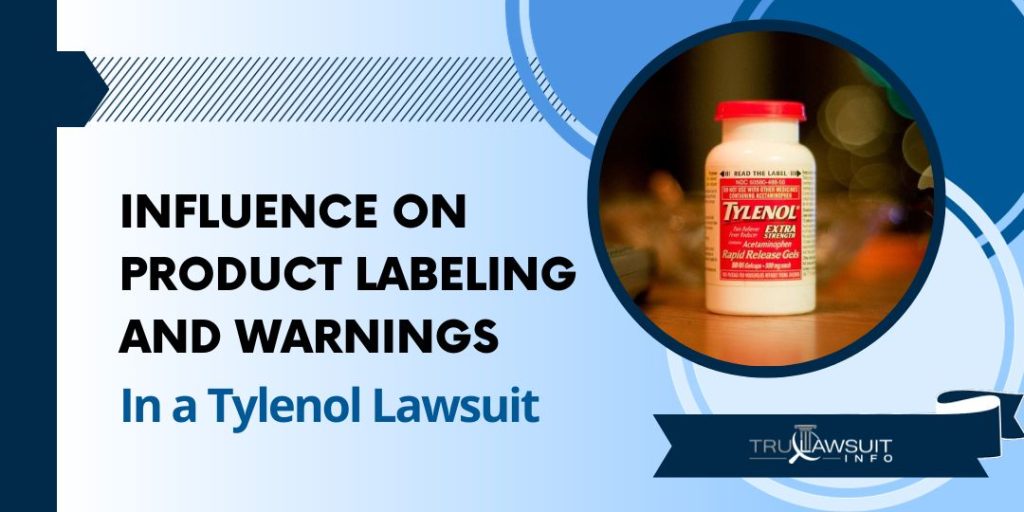
One significant outcome of lawsuits against Tylenol, which contains acetaminophen, is the influence they exert on product labeling and warnings, especially in relation to conditions like autism.
Drug manufacturers, including those of acetaminophen and Tylenol, are now taking extra precautions to ensure their labels provide clear, comprehensive information about potential side effects and risks, including autism.
This is done not only to protect consumers of products like acetaminophen and Tylenol but also to safeguard themselves against future product liability claims, including those related to autism.
Effect on Trust in Pharmaceutical Companies
Trust is a crucial factor.
However, lawsuits like this one involving autism and Tylenol or acetaminophen can erode that trust rapidly.
The revelation that manufacturers of drugs like Tylenol, which contains acetaminophen, might not be providing complete or accurate information about their products can lead consumers to question their credibility, especially when considering conditions like autism.
Direct Filing of ADHD and Autism Tylenol Lawsuits: What You Need to Know
The Direct Filing Process
The direct filing process for Tylenol autism ADHD lawsuits related to acetaminophen, commonly known as Tylenol, is a legal route an individual can take to seek damages.
This involves directly lodging a claim against the manufacturer of Tylenol rather than joining an acetaminophen-related class action lawsuit concerning autism.
A plaintiff must prepare necessary documents, including evidence of the product’s use, in this case, acetaminophen or Tylenol, and its alleged impact, possibly on autism.
This includes medical records, expert testimonies, and more.
Pros and Cons of Direct Filing
Direct filing offers several advantages:
- Greater control over your case
- Potentially higher compensation
- Personalized legal representation
However, it also comes with drawbacks:
- Higher upfront costs for legal services
- Time-consuming process
- Risk of losing the case without any compensation
Legal Requirements for Direct Filing
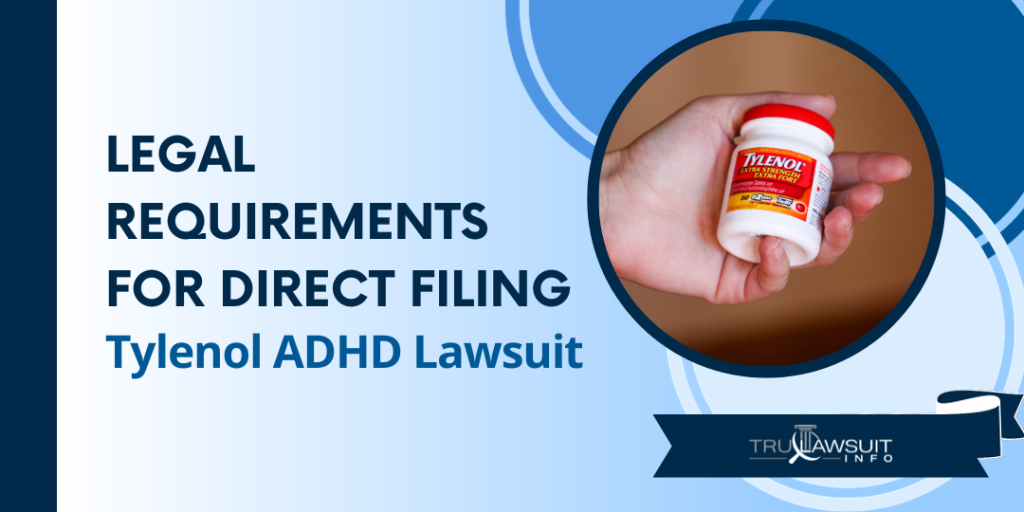
For a successful direct filing in ADHD lawsuits or autism cases related to acetaminophen, specifically Tylenol use, there are specific legal requirements that must be met.
Here are the following legal requirements that must be met:
- Evidence of Product Use: Proof that the plaintiff used Tylenol, an acetaminophen product, in the context of autism.
- Medical Diagnosis: Official diagnosis of either ADHD or autism from a healthcare professional, often involving the use of acetaminophen, commonly known as Tylenol.
- Causation: Expert testimony linking acetaminophen (Tylenol) use to the development of conditions like autism.
Failure to meet these requirements in an autism case related to acetaminophen, specifically Tylenol, may lead to dismissal of the case.
Navigating through a Tylenol autism ADHD lawsuit, perhaps involving acetaminophen or Tylenol use or any other related legal process, can be complex.
Class Action Suits: A Closer Look at the Tylenol Autism Case
Class Action Lawsuits and Tylenol
Autism class action lawsuits, particularly those involving Tylenol, an acetaminophen-based product, have drawn significant attention in recent years.
The central concern revolves around allegations that the drug, specifically acetaminophen or Tylenol, may contribute to autism cases in children.
This has led to numerous parents and guardians coming forward to file a class action lawsuit against the manufacturers of Tylenol, an over-the-counter medication, citing a possible link to autism.
In contrast with individual lawsuits, class actions present a unique legal landscape, especially in cases involving autism and Tylenol.
In a class action suit involving Tylenol, one or several individuals represent an entire group who have potentially suffered similar injuries or damages due to the same product, possibly even resulting in autism.
This differs significantly from individual acetaminophen autism lawsuits where plaintiffs file their cases independently, such as in autism-related Tylenol cases.
Benefits and Outcomes of Tylenol Class Action Lawsuits
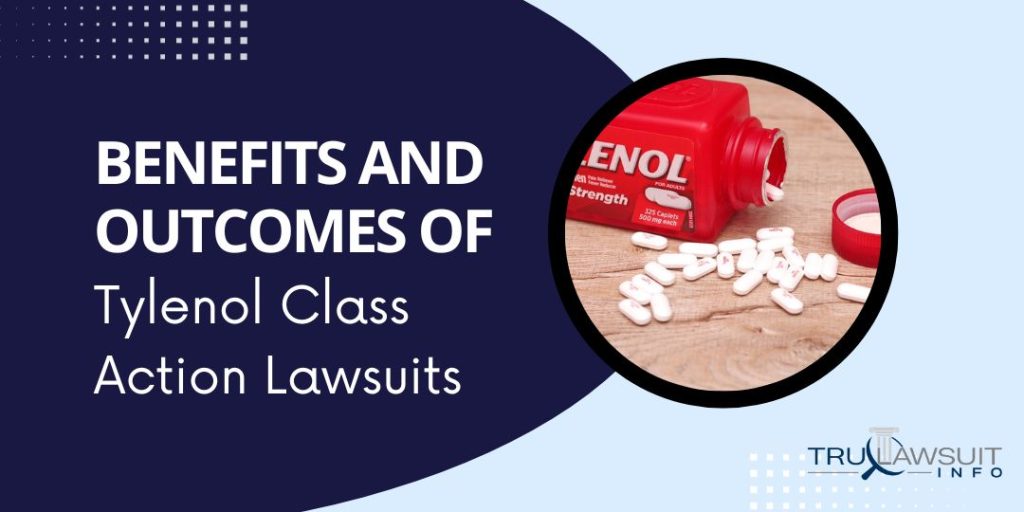
Class actions offer several prospective benefits for plaintiffs.
Firstly, they can help overcome the financial burden of Tylenol-related litigation costs in autism cases by sharing them among all members of the group.
Secondly, they allow for collective bargaining power, which can lead to larger settlements in cases related to Tylenol and autism.
Lastly, they ensure consistency in judicial rulings related to autism cases, as opposed to varying verdicts that might occur in separate trials.
Looking back at previous notable outcomes from class action suits provides insight into potential results for current cases, such as those involving Tylenol and autism.
For instance, Walmart faced a class action MDL (multi-district litigation) suit related to wage and hour violations, as well as a Tylenol-related autism case, resulting in a $160 million settlement.
The Tylenol Autism Case
The autism cases revolving around Tylenol usage are currently under scientific research scrutiny.
Causation evidence plays a pivotal role in these proceedings as it’s necessary to establish a direct link between Tylenol and autism development in children.
One study garnering attention was published by “JAMA Psychiatry,” which found acetaminophen (the active ingredient in Tylenol) exposure during pregnancy was associated with a higher risk of ADHD and autism spectrum disorders in offspring.
However, this study on who develops autism spectrum disorder and Tylenol doesn’t conclusively prove causation but rather indicates a correlation requiring further investigation.
Class action suits like the Tylenol autism case hinge on causation evidence.
They require scientific evidence that backs up claims and supports the class’s allegations regarding autism and Tylenol use.
This is where similar motion studies on autism and Tylenol come into play, providing additional data to strengthen the causation argument.
Conclusion: Understanding Your Rights in the Tylenol Lawsuit
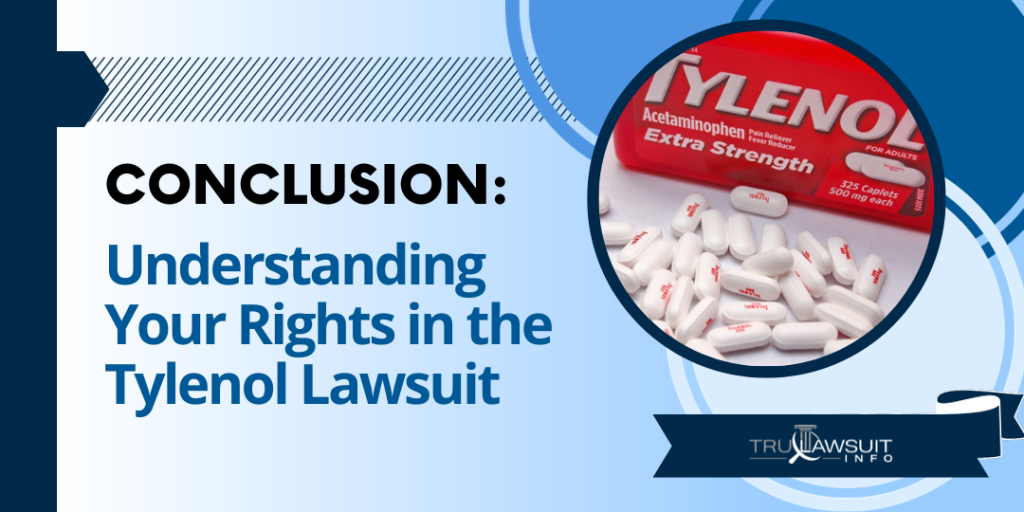
The landscape of the Tylenol lawsuit, within the context of autism, is complex and continually evolving.
It’s crucial for potential claimants to stay informed about eligibility criteria, new risks associated with Tylenol, and recent developments in related lawsuits such as those involving autism and ADHD.
Legal representation plays a key role in navigating the complexities of autism and securing a favorable outcome, even when Tylenol is involved.
If you believe you or your child with autism has been adversely affected by Tylenol, it’s essential to understand your rights and options.
Direct filing of lawsuits and class-action suits related to Tylenol are avenues worth exploring.
The impact of this Tylenol-related litigation on consumers is significant, highlighting the importance of making an informed decision about Tylenol.
Seek professional advice to explore your legal options.
Frequently Asked Questions
-
The specific eligibility criteria for Tylenol can vary depending on individual circumstances and the nature of the claim.
Generally, plaintiffs must demonstrate that they have suffered harm as a result of using Tylenol.
-
Recent studies have suggested potential links between prenatal use of Tylenol and increased risk of autism or ADHD in children.
However, more research is needed to confirm these findings.
-
It’s important to select a lawyer or law firm with experience handling drug injury cases, particularly those involving over-the-counter medications like Tylenol.
-
Direct filing allows individuals who believe they have been harmed by Tylenol to file their own lawsuits rather than joining a class action suit.
-
The lawsuit may lead to changes in how Tylenol and similar products are marketed, labeled, and sold.
The blog post also raises awareness about potential risks associated with medications like Tylenol.

Attorney Jessie Paluch, founder of TruLawsuit Info, has over 25 years of experience as a personal injury and mass tort attorney, and previously worked as an international tax attorney at Deloitte. Jessie collaborates with attorneys nationwide — enabling her to share reliable, up-to-date legal information with our readers.
Legally Reviewed
This article has been written and reviewed for legal accuracy and clarity by the team of writers and legal experts at TruLawsuit Info and is as accurate as possible. This content should not be taken as legal advice from an attorney. If you would like to learn more about our owner and experienced injury lawyer, Jessie Paluch, you can do so here.
Fact-Checked
TruLawsuit Info does everything possible to make sure the information in this article is up to date and accurate. If you need specific legal advice about your case, contact our team by using the chat on the bottom of this page. This article should not be taken as advice from an attorney.
You can learn more about the Tylenol Lawsuits by visiting any of our pages listed below:
Here, at Tru Lawsuit Info, we’re committed to helping victims get the justice they deserve.
To do this, we actively work to connect them with attorneys who are experts in litigating cases similar to theirs.
Table of Contents
Tru Lawsuit Info is a reliable source of information about issues that may affect your health and safety, such as faulty products, data breaches, and environmental hazards.
Our team of experienced writers collaborates with medical professionals, lawyers, and advocates to produce informative articles, guides, and other resources that raise awareness of these topics.
Our thorough research provides consumers with access to reliable information and updates on lawsuits happening around the country. We also can connect consumers with attorneys if they need assistance.
Here, at Tru Lawsuit Info, we’re committed to helping victims get the justice they deserve.
To do this, we actively work to connect them with attorneys who are experts in litigating cases similar to theirs.
